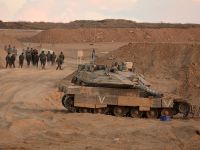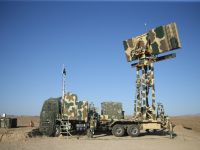Israel said Tuesday violence had fallen significantly across the West Bank for the first time since bloody Israeli-Palestinian clashes flared almost two weeks ago.
The announcement, which did not comment on conditions in the Gaza Strip, came as a flurry of diplomatic efforts continued, pressuring Israel and the Palestinians to end almost two weeks of violence.
"Today a significant decrease was felt in the amount of violent incidents in the West Bank," the Israeli army said in a statement.
The announcement came after Israeli Prime Minister Ehud Barak's decision overnight to give Palestinian leader Yasser Arafat another three to four days to try to quell the unrest that has claimed the lives of around 100 people, most of them Palestinians and Arab Israelis.
In the Gaza Strip, doctors declared 12-year-old Sami Abu Jazar clinically dead after he was shot in the head by Israeli troops who fired on Palestinian youths during clashes.
Another 14 people were wounded in those clashes, while at least 39 Palestinians were hurt in an ongoing confrontation with Israeli troops in the West Bank town of Ramallah, hospital sources said.
While peace was being discussed in some quarters, the militant Palestinian group Islamic Jihad called for the Palestinians to continue their uprising against Israeli forces.
And in Egypt, some 20,000 university students staged anti-Israeli rallies, with one in Cairo turning violent when protestors burned cars and stoned police who fired tear gas.
The violence in the Palestinian territories was giving added impetus to shuttle diplomacy by UN chief Kofi Annan and Russia's Foreign Minister Igor Ivanov.
Both met Arafat Tuesday, while, in the West Bank city of Nablus, some 200 armed and masked men gathered to launch a militia force.
It was later announced that Palestinians are forming local defense committees in the West Bank to protect themselves from attacks by Jewish settlers, a Palestinian official said.
The committees, which will operate in those parts of the Palestinian territories over which Israel has control, are being formed to "protect Palestinians from aggression being committed by the settlers," Marwan Barghuthi, secretary general of Fatah in the area told AFP.
Annan welcomed Israel's decision to give peace with the Palestinians one more chance and said Arafat was anxious for a return to calm after 13 days of deadly street battles.
"I am very pleased that the government decided yesterday not to stick to its 48-hour deadline. I think it helps," Annan told reporters after meeting Israeli Prime Minister Ehud Barak.
He added that he had "the impression that Arafat is concerned about the level of violence. He is anxious to see the situation calm down ... I believe this is possible."
The Russian official, who was due to meet with Barak and acting Israeli Foreign Minister Shlomo Ben-Ami, said Moscow still supported "a just peace in the Middle East."
Arafat derided that decision, saying: "Another warning, after another warning, after another warning."
Meanwhile, Egyptian Foreign Minister Amr Mussa, on a trip to Damascus, ruled out a US-proposed summit between Israeli and Palestinian leaders in the Egyptian resort of Sharm el-Sheikh.
The White House said the necessary conditions were not yet in place and that President Bill Clinton "has made no decision" on whether to convene a summit with Israeli and Palestinian leaders or travel to the Middle East -- denying Israeli television reports to the contrary.
In Israel late Tuesday, a public television station said without citing a source that Clinton planned to travel to Israel and the Gaza Strip in the next few days.
For its part, the British Foreign Office said Foreign Secretary Robin Cook will fly to the Middle East within the next 24 hours to lend his diplomatic weight to international efforts to restore peace.
Foreign Office sources said Cook was expected to visit Israel, the Palestinian territories, Jordan and Syria.
And the European Union's foreign policy and security chief, Javier Solana, arrived in Israel Tuesday evening on the first step of a Middle East tour aimed at trying to help reduce tension in the region.
"We have come to talk to all the parties to make an evaluation of the situation and try to suggest ways to lower the tension," Solana told a press conference following a meeting with United Nations Secretary General Kofi Annan.
The UN chief is later expected to go to Lebanon and Syria, which controls politics in Beirut and backs the Shiite Muslim fundamentalist Hezbollah, whose capture of three Israeli soldiers on Saturday raised tension on Israel's northern border.
Israel sent a fresh reminder of its military force by sending warplanes swooping across Lebanon, provoking loud supersonic bangs over southern and northern regions.
And Barak repeated that Israel reserved the right to respond when and how it chooses following the abduction of the soldiers.
"We keep to ourselves the right to respond at a time, place and means we find appropriate," Barak said at a joint press conference with Annan -- JERUSALEM (AFP)
© 2000 Al Bawaba (www.albawaba.com)







